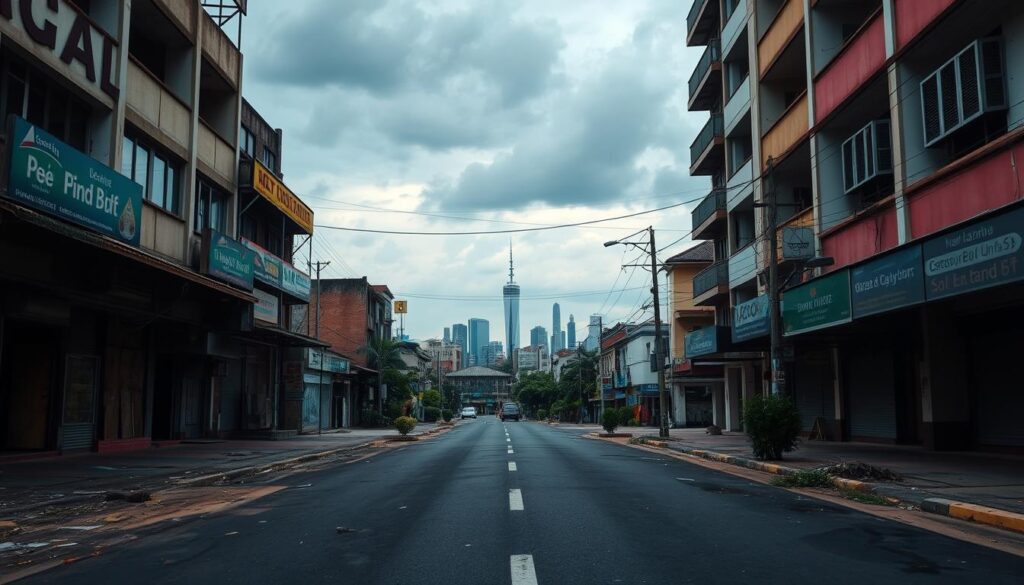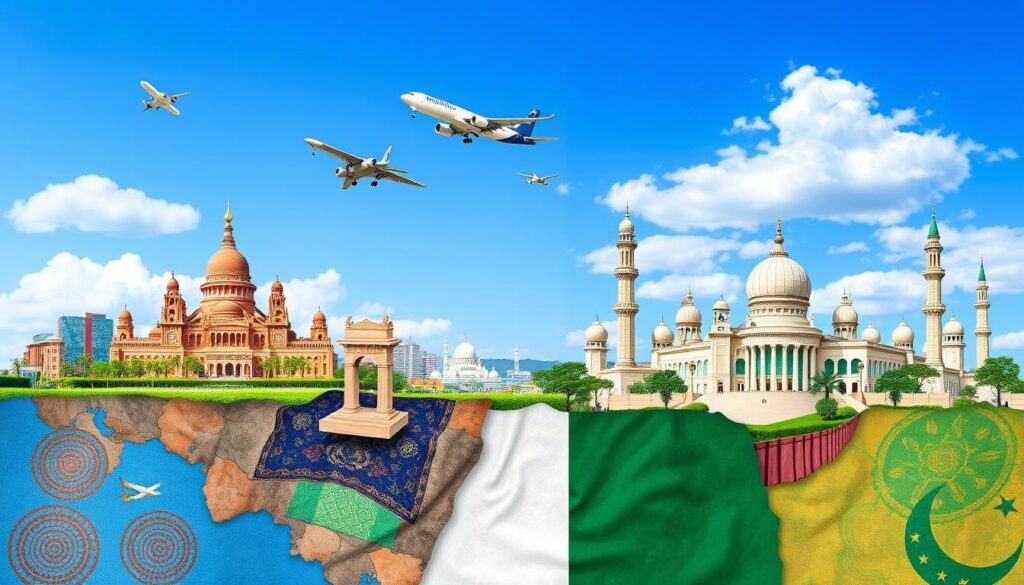Sri Lanka Declares Bankruptcy Amidst Economic Crisis 2022
Sri Lanka faces its worst economic collapse since 1948. The country’s financial woes have led to sky-high inflation and depleted foreign reserves. Essential goods are scarce, and basic commodity prices have soared.

The crisis has sparked nationwide protests and resulted in Sri Lanka’s first sovereign debt default. Prime Minister Ranil Wickremesinghe admitted in parliament that the economy had collapsed.
Political turmoil and poor economic choices have worsened the situation. The Sri Lankan Rupee hit a record low of LKR 368.50 against the US dollar in November 2022.
This represents a 555% annual depreciation. By May 24, 2023, the currency had improved to LKR 305.00. However, economic recovery remains a distant goal.
The country’s heavy reliance on foreign debt and dwindling reserves have contributed to the crisis. Policy missteps have also played a role. These factors have left Sri Lankans bearing the brunt of economic hardship.
Background of Sri Lanka’s Economic Crisis
Sri Lanka’s economic crisis has been brewing for over a decade. The country’s debt-to-GDP ratio has been rising since 2010. Foreign debt skyrocketed from $11.3 billion in 2005 to $56.3 billion in 2020.
The debt as a percentage of GDP jumped from 42% in 2019 to 119% in 2021. This massive debt, along with policy confusion and political turmoil, led to economic collapse.

The Institute of Policy Studies of Sri Lanka warned about economic risks in 2014. However, the government ignored these economic warnings. Political chaos in 2018 made things worse.
A new government in 2019 scrapped the Central Bank Bill. This bill aimed to free the bank from political meddling and stop money printing.
Mounting Debt and Dwindling Reserves
Sri Lanka’s foreign currency reserves have fallen drastically. They dropped from $7.6 billion in late 2019 to $250 million in early 2022. The country owes $7 billion to China and $1 billion to India.
Sri Lanka faces a yearly deficit of $3 billion due to import-export imbalance. This has made it hard for the country to pay its debts.
| Year | Foreign Debt (US$ billion) | Foreign Debt as % of GDP |
|---|---|---|
| 2005 | 11.3 | – |
| 2019 | – | 42% |
| 2020 | 56.3 | – |
| 2021 | – | 119% |
In 2019, the government slashed taxes, losing $1.4 billion in yearly revenue. This put more strain on the country’s finances. Sri Lanka’s external debt kept growing, with $8.6 billion due in 2022.
These factors pushed Sri Lanka to the edge of bankruptcy. The country now faces a severe economic crisis.
Causes of Sri Lanka’s Economic Collapse
Sri Lanka’s economy crumbled in 2022 due to several factors. Large tax cuts, excessive money printing, and growing foreign debt were key issues. The Gotabaya Rajapaksa government’s tax cuts slashed revenue and worsened fiscal policies.
To cover spending, the Central Bank printed money at record levels. This ignored advice from the International Monetary Fund (IMF). The excess cash led to higher purchasing power and import demand.
As a result, the balance of payments deficit grew. The gap was filled with costly loans from international commercial markets.
Sri Lanka’s Foreign Debt Burden
Sri Lanka’s foreign debt skyrocketed from $11.3 billion in 2005 to $56.3 billion in 2020. It rose from 42% of GDP in 2019 to 119% in 2021. By 2024, external debt reached $37,040 million, 43% of GDP.
The mounting debt and dwindling foreign reserves led to a crisis. In April 2022, Sri Lanka defaulted on its foreign debt obligations.
| Year | Foreign Debt (USD Billion) | Foreign Debt as % of GDP |
|---|---|---|
| 2005 | 11.3 | – |
| 2019 | – | 42% |
| 2020 | 56.3 | – |
| 2021 | – | 119% |
| 2024 | 37.04 | 43% |
Credit Rating Downgrade
The economic crisis led to a downgrade in Sri Lanka’s credit rating. International agencies lowered it to default grade. This made it harder for the country to borrow more money.
The credit downgrade worsened Sri Lanka’s economic troubles. It limited access to global financial markets and increased borrowing costs.
These issues played a major role in Sri Lanka’s 2022 economic collapse. Addressing these problems and implementing reforms is crucial for recovery and future stability.
Sri Lanka Declares Bankruptcy Amidst Severe Economic Crisis in 2022
In 2022, Sri Lanka faced a dire financial situation. Prime Minister Ranil Wickremesinghe declared the country “bankrupt” during an unprecedented economic crisis. The nation’s foreign exchange reserves dropped to $2.31 billion by February.
Sri Lanka owed around $4 billion in debt repayments that year. This included a $1 billion international sovereign bond due in July. The country struggled to meet these obligations.
Foreign reserve depletion left Sri Lanka with less than a day’s worth of fuel. Schools suspended operations, and citizens faced severe fuel shortages. Food insecurity became widespread due to the economic collapse.
Sri Lanka defaulted on its debt for the first time since 1948. The country spent 9.2% of its GDP on foreign debt payments in 2022 alone.
Inability to Pay Foreign Debt Obligations
Sri Lanka’s total debt burden reached $51 billion. The nation owed about $29 billion from July 2021 to 2026. It couldn’t meet debt repayments, including a $78 million coupon payment on two bonds.
Prime Minister Acknowledges Economic Collapse
Wickremesinghe’s bankruptcy statement highlighted challenges in IMF negotiations. Sri Lanka entered talks as a bankrupt nation, not a developing one. This made economic recovery uncertain and difficult.
The crisis deeply affected Sri Lanka’s 21.8 million people. The UN reported that four out of five people now skip meals. Sri Lanka has South Asia’s second-highest child malnutrition rate, after Afghanistan.
Conclusion
Sri Lanka’s financial crisis stems from years of economic mismanagement, excessive debt, and global crises. The country’s GDP shrunk by 7.1% in 2022’s first three quarters. Inflation peaked at 70% in September 2022 but dropped to 54% by January 2023.
The government seeks IMF and international aid to tackle the crisis. Sri Lanka owes $51 billion externally, with 13 banks on rating watch negative. It’s among the world’s biggest loan defaulters, making the IMF bailout crucial.
The UN warns of a looming humanitarian crisis in Sri Lanka. About 500,000 more people now depend on aid. The country faces severe shortages of essentials like food, fuel, and medicine.
The financial crisis has pushed many into poverty. Predictions suggest a 10.9 percent poverty rate by 2021, equal to $3.20 per day.
Sri Lanka must prioritize its citizens’ well-being and address the crisis’s root causes. This includes reforms, improving transparency, and working with international partners. Only then can Sri Lanka build a more stable and prosperous future.




